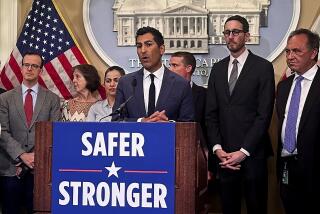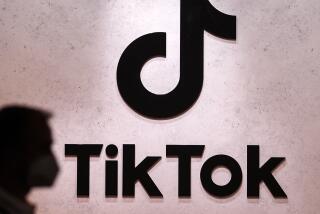Deal Reached on Bill to Slow Suits Over Y2K
- Share via
WASHINGTON — The White House reached a deal with Congress on Tuesday on a bill aimed at preventing a crush of lawsuits stemming from expected Year 2000 computer glitches, a measure at the top of the high-tech industry’s legislative wish list.
The compromise bill, which the House and Senate may endorse before their July 4 recess, seeks to reduce frivolous litigation by restricting class-action lawsuits and putting a cap on punitive damages in Y2K cases.
Negotiators added more consumer protections to the measure, including a key compromise that would raise the cap on class-action lawsuits from $1 million to $10 million.
President Clinton had threatened to veto the legislation, labeling it too friendly to businesses and lacking adequate safeguards for consumers. The compromise that his negotiators have accepted still leaves some consumer groups displeased but the White House was facing political pressure to come up with an agreement.
Some Republican backers of the legislation had relished the possibility of a presidential veto--which might have interrupted the flow of campaign contributions from the high-tech industry to Democrats.
The veto loomed as a particularly troubling prospect for Vice President Al Gore, who has heavily courted Silicon Valley in his bid to succeed Clinton but stood with the president against the Y2K legislation as originally proposed.
The standoff over the bill ended amicably Tuesday with an agreement that, according to White House and congressional officials, addresses some of Clinton’s concerns without weakening the legislation excessively.
The crux of the dispute is who ought to be responsible for potential computer snafus--ranging from malfunctioning ATM machines to snarled airplane navigational systems--that some fear will result with the arrival of year 2000. The problem stems from computer programs designed to recognize years only by their final two digits. In the case of 2000, some computers mistakenly recognize the year as 1900.
The pending legislation would make it tougher for consumers who suffer losses stemming from this computer glitch to collect damages. Advocates of the legal protections say that the law would lapse after three years and is designed to permit businesses to focus on fixing the problem rather than worrying about litigation.
The House approved its version of the Y2K legislation in May on a 236-190 vote. A somewhat different measure passed the Senate, 62 to 37, earlier this month. Tuesday’s deal emerged from a House-Senate conference committee meeting intended to reconcile the two versions. Connecticut Sen. Christopher J. Dodd, one of the Democratic supporters of the Senate bill, acted as a go-between with the White House.
The legislation would encourage mediation as an alternative to lawsuits and give companies three months to fix Y2K-related computer problems before plaintiffs could take their complaints to court. Sen. John McCain (R-Ariz.), chief author of the Senate bill, declared himself satisfied with the final product.
“It’s probably more negotiations than I have ever gone through,” said McCain, who warned that failure to act could have “crippled the economy” with lawsuits estimated to reach $1 trillion.
“The Y2K bill will allow businesses to put their money into fixing the problem rather than spend it paying lawyers to deal with frivolous litigation,” Thomas J. Donohue, president of the U.S. Chamber of Commerce, said in a statement.
But foes of the legislation expressed chagrin.
“Corporations have contributed millions in campaign contributions to both political parties and have just purchased a strong legal shield for themselves for making and selling Y2K-defective products,” said Joan Claybrook, president of Public Citizen, a consumer group.
Sen. Ernest F. Hollings (D-S.C.), who had blocked Senate consideration of the bill for weeks, voiced similar concerns.
“There are no circumstances in which a citizen who has been sold a defective product should get fewer rights than the manufacturers who sold it,” said Hollings spokesman Maury Lane.






